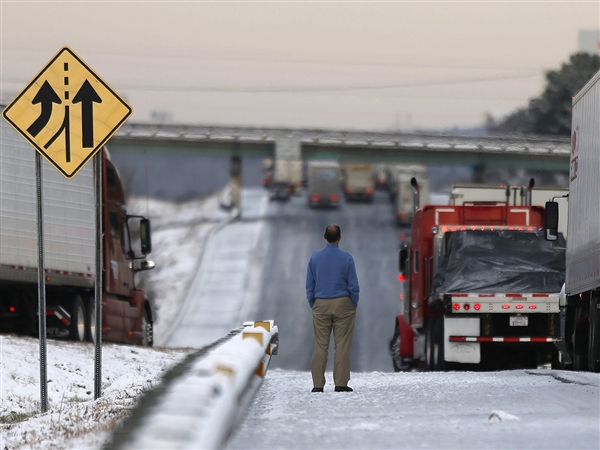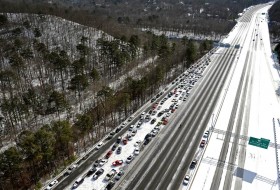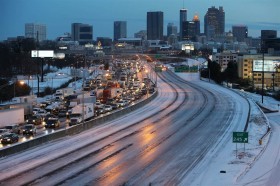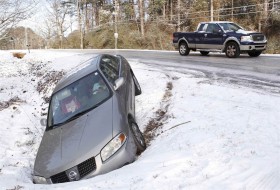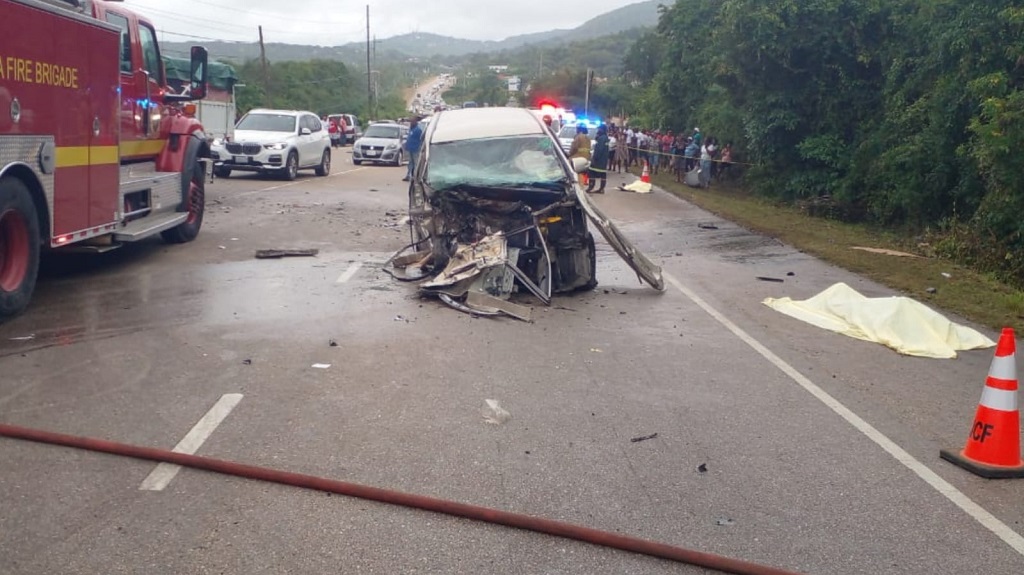A man stands on the frozen roadway as he waits Wednesday for traffic to clear along Interstate 75 in Macon, Ga.
Thousands of drivers were hopelessly stuck for a second day Wednesday, many without food and water, on paralyzed interstates around Atlanta after a winter storm appeared to take the city by surprise.
State and local authorities had no estimate for how many people were stuck, but they said jackknifed 18-wheelers were causing a problem on freeways that were still slick with ice. Some people abandoned their cars altogether and walked to warmth and shelter.
Gov. Nathan Deal ordered the National Guard to clear the way for school buses that were carefully delivering schoolchildren back to their homes after thousands of them were marooned overnight. National Guard troops were distributing blankets and 200 cases of military-style MREs, or meals ready to eat, along Interstate 20.
Churchers, groceries and home-improvement stores opened their doors to the stranded. Neighbors took in neighbors and strangers. At least one baby was born in a car, helped by a police officer.
Aerial pictures made the highways look like parking lots, and there was no indication of when or how the roads would be cleared. Twenty hours into the jam, one trucker, Joe Schmitz, told NBC News that drivers would probably be stuck for a second night.
“There are some people who are really kind of scared,” he said. He added that truckers were taking drivers into their rigs to keep them warm as cars ran out of gas.
Authorities found themselves defending, and in some cases apologizing for, a slow response to the storm.
It was not close to the worst in Atlanta’s history — about 2½ of snow fell — but authorities said everyone seemed to leave work and school at the same time on Tuesday afternoon, jamming the roads.
Deal said that state workers were ordered home on Tuesday afternoon but that he had had no control over what private businesses and schools decided to do.
Deal apologized but added: “It’s easy to make judgment calls after the fact, but I dare say there’s not anybody in this room that could have predicted the degree and the magnitude of the problem that developed.”
Kasim Reed, the mayor of Atlanta, pointed out that there had been no deaths on the Atlanta roads. He grew testy with reporters who asked him to grade the city’s response. He also said the interstates were the responsibility of the state government, not the city.
“I’m not going to do this with you today,” he told one reporter. He blamed the traffic mess on “everyone exiting at the same time.”
“I don’t blame anybody for that,” he said at a news conference. “People were making a lot of independent decisions. What we will do in the future is try to coordinate that and make a strong recommendation about how that should flow.”
He also said: “The crisis that we’re going through is across
the region. There’s no one who’s doing any better job than we’re doing in the city of Atlanta. What we did do was get a million people out of the city safely.”
Tens of thousands of schoolchildren were stuck Tuesday evening either aboard school buses or in their schools. By Wednesday at midday, the governor said, there were several thousand still in schools. Besides the National Guard, police were helping get them home.
“I’ve never seen anything like this,” Tim Dougherty said from Interstate 285, north of the city, where he had been stranded for 18 hours and could see only a string of tail lights on Wednesday morning. “I’ve got to say for a city this is an epic failure.”
The storm coated the South with snow and ice, and struck a part of the country not accustomed to responding to snowstorms, plowing roads and salting streets. At least six deaths were blamed on the storm, five in Alabama and one in Georgia.
Birmingham Mayor William Bell said teachers stayed with stranded students throughout the night, giving them food and water and trying to keep them calm.
“We realize that is not good enough for parents who want to hold their children in their arms,” Bell told Reuters. “We are doing all we can to reunite children with their parents.”
At least 850 children were stuck at school in Marietta, Ga., where buses started to take the kids home on Tuesday afternoon but had to turn back because of bad roads.
Traffic maps of Atlanta looked like an illustration of the human heart, red arteries in all directions. Gov. Nathan Deal sent military Humvees on to the clogeed freeways to deliver food and water and help stranded school buses.
“We know you want to get home, and we are going to work all day until you can return safely,” Reed, the Atlanta mayor, said early Wednesday on Twitter.
The baby born during the gridlock was a little girl, delivered by her father and a police officer on I-285. Paramedics got the family to a hospital.
“I pulled over to check on them, and I asked the dad, ‘Are y’all broke down?’” the officer, Tim Sheffield of the Sandy Springs police, told TODAY. “He goes, ‘No, we’re having a baby.’”
The Home Depot said it kept 14 Atlanta-area stores open overnight to provide shelter for stranded drivers.
“People are helping each other out. People are moving cars that have spun out or had become disabled,” Debbie Hartwig, a waitress at an Atlanta-area Waffle House, told The Associated Press. “It’s been really nice. I even saw people passing out hot coffee and granola bars.”
Most of the storm’s worst had passed by Wednesday morning, but a winter storm warning was still in effect from the Florida Panhandle to Ocean City, Md., and a hard-freeze warning stretched from Texas through Alabama.
“Today will be just as bad as yesterday in terms of the state of the roads,” said Guy Walton, a meteorologist for The Weather Channel.
Icy roads were further snarled by businesses and schools letting people leave early on Tuesday in an attempt to beat the worst of the bitter conditions. Authorities in Alabama were left red-faced after declaring a state of emergency only for the southern half of the state, leaving out hard-hit Birmingham and sending available equipment the other way.
Not all the misery was on the roads: More than 3,500 flights were delayed across the U.S. by mid-morning Wednesday with another 1,426 canceled, according to FlightAware.






